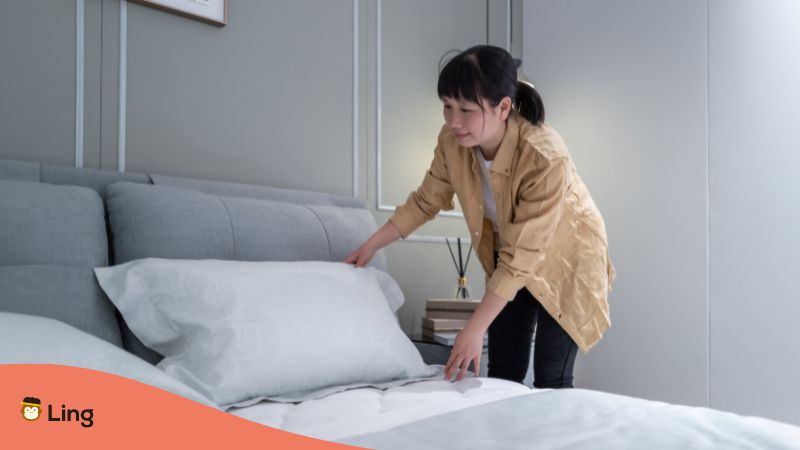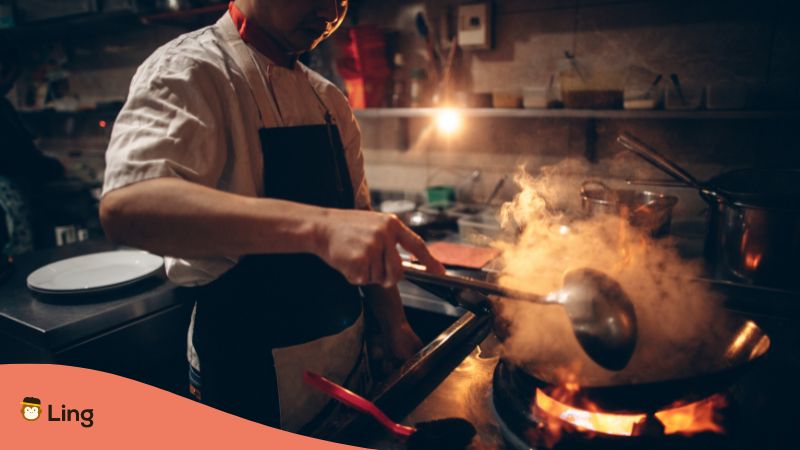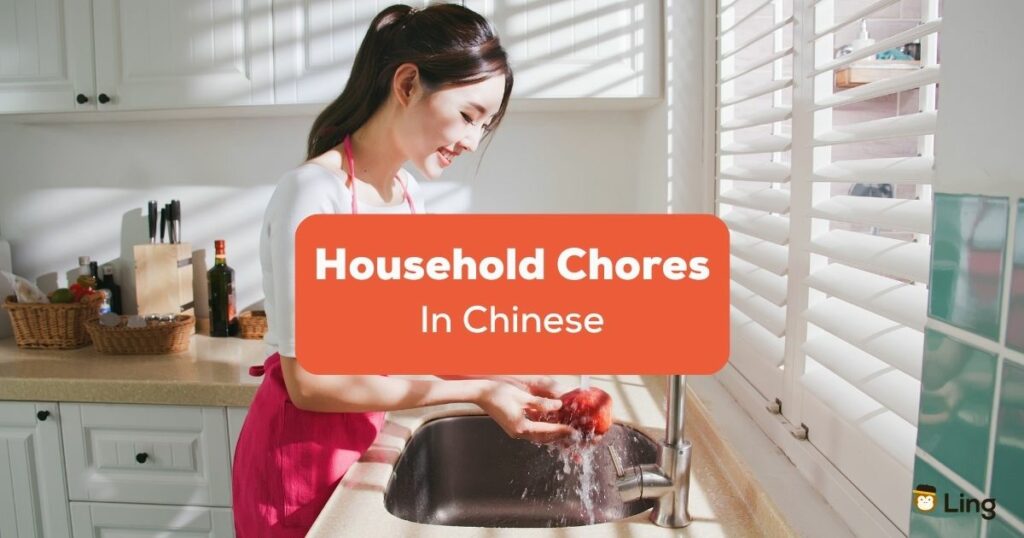Whether we like it or not, household chores 家务事 (jiā wù shì) are an essential part of our everyday life. Today, we’ll learn about household chores in Chinese.
Ah, chores! They can be tedious and time-consuming duties and even a burden for some, but let’s admit it: They must be completed for a household to function efficiently. In this era, household chores are not just for women, girls, or wives anymore. They will also be helpful for men, children, and young adults. Aside from keeping the house clean and organized, household chores can also teach us some valuable life skills such as responsibility, self-reliance, teamwork, planning, and time management skills.
Let’s get to know more about these chores in the sections below!
Common Household Chores In Chinese

Make The Bed – 铺床 (Pūchuáng)
Some people might say, “Why should I make the bed if I’m just going to mess it up tonight?” Well, it turns out that putting things away when you wake up makes sense. Even a small success, like making your bed, is a good way to start the day. It can make you feel like you’re in charge, give you a sense of pride, and encourage you to keep getting things done.
Wash – 洗 (Xǐ)
Washing is another important household chore. There are lots of chores related to washing, like washing dishes, washing vegetables or meat when cooking, and more. Here are more household chores in Chinese related to washing:
| English | Chinese | Pinyin |
| wash clothes | 洗衣服 | xǐ yīfú |
| wash dishes | 洗碗 | xǐ wǎn |
| to wash or clean | 清洗 | qīng xǐ |
| to rinse | 洗涤 | xǐ dí |
| to wash clean | 洗净 | xǐ jìng |
Wipe – 擦 (Cā)
Wiping does a lot for the cleanliness of our home. It is the housework that we do every day. Below are other household chores related to wiping:
| English | Chinese | Pinyin |
| to wipe clean | 擦拭 | cā shì |
| to wipe dry | 擦干 | cā gān |
| to polish | 擦亮 | cā liàng |

Cook – 做飯 (Zuòfàn)
Cooking is a household chore that others may find fun and enjoyable. Of course, you’re making food, but it will be a lot more challenging if you spend a lot of time cooking for the whole family. Since we’re talking about food, there are lots of Chinese food that you can start cooking if you’re interested in Chinese culture.
Set The Table – 摆桌子 (Bǎi Zhuōzi)
Table setting has always been significant. It welcomes guests and sets a formal dining tone, ensuring that everyone gets along, dines comfortably, and has a good time. Chinese banquets are happy get-togethers where everyone sits around a big table and shares big food.
So, the tableware and setting are made to be useful and take up as little room as possible so that a group can eat together. Sit down once the host and guest of honor have done so. Usually, there is a bowl for each person on a plate, chopsticks to the right, and a soup bowl, spoon, dish, and teacup in front. Some places might also give you a napkin.
Sweep The Floor – 扫地 (Sǎodì)
Clean floors are important for keeping a place safe, healthy, and welcoming. They can keep people from getting hurt, improve the air quality inside, stop the spread of germs and bacteria, keep the space looking nice, and keep the floors from getting damaged.
Babysit – 照看孩子 (Zhào Kàn Hái Zǐ)
Babysitting is a very complicated household chore that many people find too challenging, especially if you are a mother. In China, there are no rules about who can be a babysitter. Most people have a relative or an ayi watch their kids. Ayis can be hired from time to time for a small amount of money. On the other hand, websites like NannyBeijing and advertising ads in English-language newspapers and websites can be helpful.
Other Household Chores In Chinese
Aside from the basic household chores in Chinese above, here are some more to add to your vocabulary:
| English | Chinese | Pinyin |
| to wash dishes | 洗碗 | xǐ wǎn |
| to clean stove | 擦灶台 | cā zào tái |
| to clean oven | 擦烤箱 | cā kǎo xiāng |
| to clean microwave | 擦微波炉 | cā wēi bō lú |
| to reorganize utensils | 整理厨房用具 | zhěng lǐ chú fáng yòng jù |
| to disinfect the rubbish bin | 刷浴缸 | shuā yù gāng |
| to clean sink | 清理水槽 | qīng lǐ shuǐ cáo |
| to clean toilet | 打扫浴室 | dǎ sǎo yù shì |
| throw away old cosmetics and toiletries | 扔掉不用的化妆护肤用品 | rēng diào bù yòng de huà zhuāng hù fū yòng pǐn |
| wipe shower curtain | 擦浴帘 | cā yù lián |
| refill soap | 补充洗手液 | bǔ chōng xǐ shǒu yè |
| to disinfect rubbish bin | 消毒垃圾桶 | xiāo dú lā jī tǒng |
| to put away | 收拾 | shōushi |
| to take out the garbage | 把垃圾拿出去 | bǎ lājī náchūqù |
| to mop | 拖 | tuō |
| to dust | 拂去灰尘 | fúqù huīchén |
| to dry | 干 | gān |
| to dry the dishes | 擦干盘子 | cāgān pánzi |
| to fold (clothes, linen) | 叠 | dié |
| to dust (shelves, cabinets) | 掸/撢 | dǎn |
| to tidy | 收拾 | shōu shi |
| to mop (floors) | 拖 | tuō |
| to vacuum | 吸尘 | xī chén |
| to clean windows | 擦窗户 | cā chuāng hu |
| to dust shelves and surfaces | 掸灰尘 | dǎn huī chén |
| to clean mirrors | 擦镜子 | cā jìng zi |
| to water plants | 浇花 | jiāo huā |
| to fold laundry | 叠衣服 | dié yī fu |
| make the bed | 铺床 | pū chuáng |
| wash bed sheets | 洗床单 | xǐ chuáng dān |
| to flip mattress | 翻床垫 | fān chuáng diàn |
| to organize closet/wardrobe | 整理橱子/衣柜 | zhěng lǐ chú zi/ yī guì |
| to clean under the bed | 整理床底 | zhěng lǐ chuáng dǐ |
| to mow grass | 割草 | gē cǎo |
| to wash car | 洗车 | xǐ chē |
| to tidy garage | 收拾车库 | shōu shi chē kù |
| to buy groceries | 买菜 | mǎi cài |
Practice Your Language Skills With Ling!
Yes, household chores are essential for our everyday lives. But, if you’re a language learner, one of the important chores you should do is practice your language skills. So, if you’re passionate about learning Chinese, there is no need for formal education to start your journey. With the Ling app, you can learn Chinese and practice your language skills at home.
This app has a lot of advanced features like smart flashcards, audio recognition technology, fun quizzes, and more. In addition to that, it also provides example sentences, conversations, and audio recordings from native speakers that will support your learning. So, consider language learning as one of your enjoying everyday chores. Learn Chinese with the Ling app now!



































































